by Robert Lynch; December 22, 2023
With the stroke of her pen late Friday, New York Governor Kathy Hochul set into motion a monumental change in the way upstate voters fill local offices. And as she did, she altered—and likely reduced—the level of prominence local elections for Town Boards, County Legislatures, and numerous other local offices hold in the minds of voters.
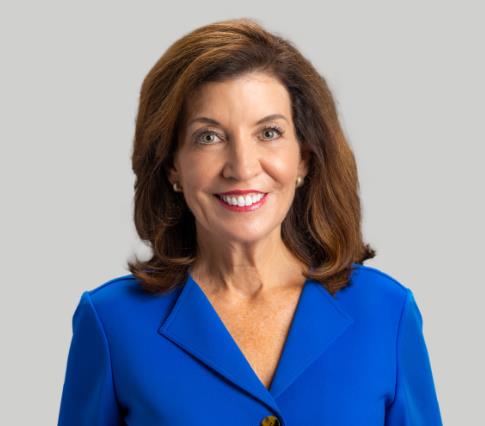
Acting on legislation the New York Assembly and Senate adopted hurriedly during their sessions’ final hours over six months ago, but which remained bottled up in Albany’s procedural machinery until only a few days ago, the Democratic Governor signed party-favored bills that will move the elections for many local legislative and administrative offices from odd-numbered years to even-numbered years beginning in 2026.
“Every eligible New Yorker deserves the right to participate in the democratic process without unnecessary barriers,” Governor Hochul stated, albeit misleadingly, in a Friday afternoon news release that characterized the bill she’d just signed as “Voting Rights Legislation” that would “expand access to the ballot box and improve voter participation.”
“By signing this legislation, we are taking a significant step towards expanding access to the ballot box and promoting a more inclusive democracy,” Hochul’s statement asserted. “This is a meaningful first step and I would support a constitutional amendment to align all election years, to save taxpayer dollars and avoid voter fatigue.”
The Governor made no mention in her statement that governmental and political opinion stands sharply divided on the now-authorized election year change. Her 1500-word, Friday-before-Christmas news release failed to acknowledge that many strong voices in this state oppose changing the election years. Nor did her statement give even a slightest hint that anyone would have good reason to oppose what she’d just put into law.
Republican critics were quick to charge that what the Governor and her partisan allies have done stands as nothing more than a boldfaced attempt to usher Democrats into office.
“If ever a bill deserved a veto, this was it,” Assembly Minority Leader Will Barclay said in a statement moments after Hochul’s signing was announced. “And as a former elected official at the county level, the governor should have known better,” Barclay added. “Moving local elections to even-numbered years will completely shift the focus away from local candidates, campaigns and community concerns. Those critical elections will now be shoved aside and sent down-ballot by bigger races on statewide and national scales.”
State Senate Minority Leader Robert Ortt used even stronger words. He alleged that Democrats’ professed benefits of the legislation constitute “a total sham concocted to hide the Democrat’s goal of expanding one-party control to every level of government.”
“As a former Town Board member and County Clerk, Governor Hochul’s personal experience in local government should have led her to do the right thing and veto this bill,” Ortt said. “Instead, she has sided with the radicals in Albany who are obsessed with consolidating their political control and stomping out any political balance in New York.”
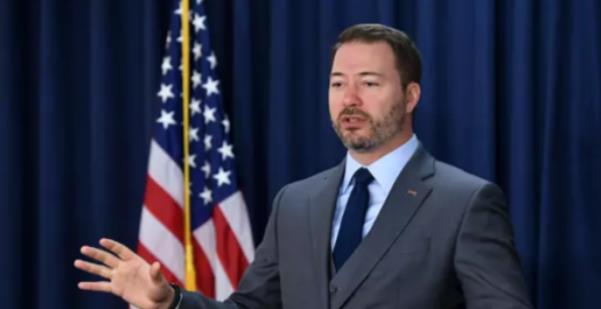
The change Hochul’s signing authorized would not affect local terms of office currently running nor for upcoming terms of candidates chosen in last month’s elections, persons set to be sworn into office around this New Year’s Day. Notably, it would also exempt elections in New York City.
In September, the New York State Association of Counties (NYSAC), an organization representing more than 300 town supervisors and county legislators drawn from 57 upstate counties, unanimously adopted a resolution urging Governor Hochul to veto the pending legislation. The Tompkins County Legislature, numerous other county legislatures and town boards, as well as the Tompkins County Council of Governments (TCCOG) had supported a veto as well.
“The State Legislature did this in in the dark of night in the final hours in Albany,” Onondaga County Executive Ryan McMahon said as a leading voice behind NYSAC’s opposition. McMahon chastised Democratic leaders for not holding hearings or assessing the public’s need for a change.
The eleventh-hour June legislation came on largely party-line votes in the Senate and Assembly. Republicans see the election-year change as a sly Democratic trick to shift local elections to even-numbered years when candidates for President, Governor and/or Congress are also on the ballot, years when experience shows Democrats stand more likely to vote.
Both Tompkins County’s state legislators, State Senator Lea Webb and Assemblymember Anna Kelles, supported the bills that Hochul signed.
“Local elections are more important than Presidential elections,” Enfield-Newfield legislator Randy Brown asserted during a spirited June 20th debate that ended with the Tompkins County Legislature voting 10-4 to support a veto. “I just think… President, Vice-President, or even Senators aren’t going to have the connections to the community that local people who run are,” Brown said prior to his vote.
Only three Republicans sit on Tompkins County’s Legislature. The other seven votes that night supporting a veto came from Democrats. Lansing’s Deborah Dawson was among them. Dawson pointed to the imbalanced workload the law’s change would place upon the Board of Elections.
“If we lump all (elections) that into one year,” Dawson observed, “there are going to be years when they’re going to be busier than a one-armed paper-hanger and then years when they’re eating bon-bons.”
And to counter Hochul’s supposed assertion that what she signed Friday somehow liberates New York’s electorate from the chains of voter suppression, Dawson had an answer:
“To equate this with voter suppression is just spurious,” Dawson stated outright “No one is suppressing the vote. People choose not to exercise their right to vote. That’s their choice.”
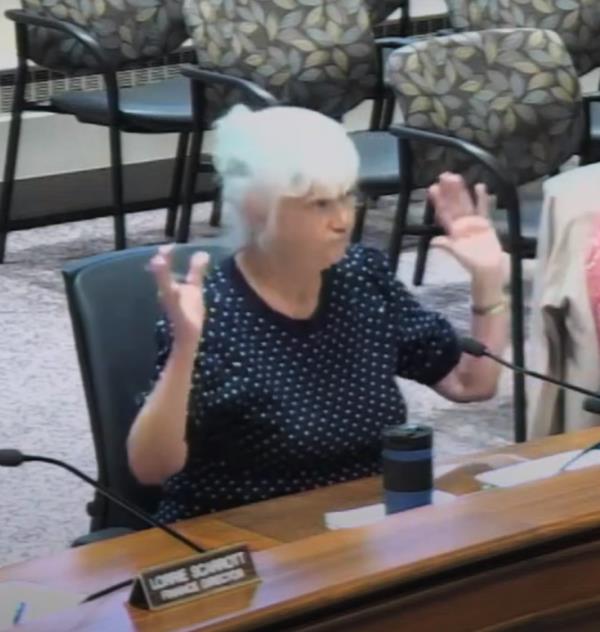
To critics like Democrat Dawson and Republican McMahon, what Governor Hochul and fellow Democrats seek to do is to force marginally-engaged voters to ballot for local candidates they know little about for offices they couldn’t care less about. And Republicans fear that once a Democratic vote for President or Governor is cast, the typical disengaged voter will simply become a polling booth automatron; inking little blue dots straight across the page without thinking.
“When elections are held in odd-numbered years, away from the traditional election cycle that voters are most familiar with, the cost of participating in the democratic process is increased, particularly for voters who may have a difficult time arranging for time off of work and traveling to their polling site,” the Governor’s Friday press statement proclaimed. “Democracy works best when all eligible voters can participate, and this new law advances New York State toward that goal,” it continued.
But any perceived efficiencies, or, for that matter, any need for voters to waive off their November civic responsibilities in boredom-plagued, odd-numbered years won’t happen for a while. The new law does not shorten (or lengthen) the term of office for any currently-elected official. Elections for any offices set to expire in 2025—including for all seats on the Tompkins County Legislature—would still need to be held as usual. The 2025 elections would be held, but the terms of many candidates elected that year would be shortened by 12 months.
For example, the two-year term of office for Enfield Town Supervisor, elected this year, would be up for election again in 2025, not before. But the Supervisor’s subsequent 2026-2027 term would be cut to a single year for just one election cycle. He or she would need to run again in 2026 for a term concluding in 2028.
And when current, four-year terms for Enfield Councilperson expire, either in 2025 (Councilpersons Hinkle and Lemke) or in 2027 (Millspaugh and Lynch, this writer), elections would be held for a single, three-year term thereafter to get all Councilpersons on the even-year cycle. Not until 2029 would the political landscape become virtually barren.
The newly-signed law would impact town offices of Enfield Town Clerk and Highway Superintendent, but not County Clerk, Sheriff, or District Attorney. Nor would it alter terms for city mayors or alderpersons. Governor Hochul wants to change those terms, too. But some changes require state constitutional amendments.
If anyone’s fingerprints were all over the bill Governor Hochul signed Friday they were those of State Senator James Skoufis of Orange County:
“I sincerely thank Governor Hochul for thoughtfully cutting through the noise and standing up for democracy – signing this legislation is a transformative win for voter participation, equity, and representative government,” Skoufis said following the Governor’s action.
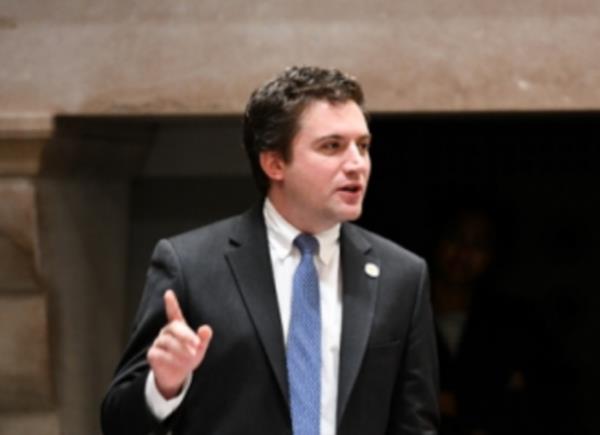
Of course, one man’s “noise” is another person’s reasoned dissent; an opponent’s pointing out the flawed reasoning and alleged partisan motivations.
Retiring Ithaca Alderperson Cynthia Brock, a Democrat, is one of those who sees the newly-signed legislation as ill-advised.
“From my personal experience, I do fear that in a community such as ours, (for) down-ticket elections; that our issues would get lost if all the bandwidth is really focused on the national issues,” Brock told a September meeting of TCCOG, a session which urged a gubernatorial veto, albeit by a split vote mirroring that of the County Legislature.
In even-years, when prospective Presidents or Governors are on the ballot “people will tend to think on very broad issues,” Brock thoughtfully told TCCOG. “They won’t be thinking so granularly on how local representatives will be campaigning on how their issues pertain to… the things around them.”
But while Brock focuses on fostering critical thought, one can easily understand the motivations of lawmakers like Senator Skoufis whose primary goal is to drag live bodies to the polls in the greatest possible numbers so as to inflate turnout for down-ballot races.
“This is a good thing that the New York State Legislature has done,” Dryden’s Mike Lane told the June 20th County Legislature meeting where a majority urged a Hochul veto, but he did not. “You folks are off track with this,” Lane chastised his majority colleagues.
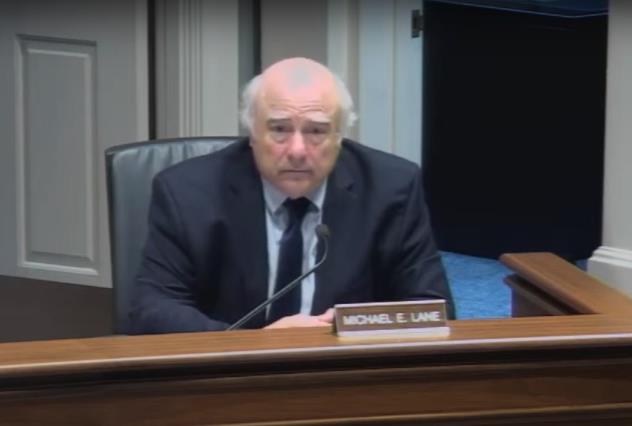
Lane’s position finds support elsewhere. “Increased turnout does validate candidates running for local elections,” Dryden Councilperson Dan Lamb told that September meeting of TCCOG, Lamb countering Cynthia Brock’s argument. Statistics prove that those who vote in odd-numbered years, Lamb said, “tend to be skewed toward older, whiter property owners, as opposed to the broader coalition of people that turn out in even years.”
“I know what you’re saying,” Brock responded. “Definitely the participation is there. If participation is the only measure that you’re looking at, I would agree with you. But I don’t know that it’s going to lead to better government.”
We’ll see. The first town and county offices will move to even-numbered years in 2026. Enfield’s Supervisor, Town Clerk and Highway Superintendent will be the first to test the new rules. And if Deborah Dawson is right, by 2029, your friendly, local ballot clerk will be eating her bon-bons.
[Ashley Hupfl of the Schenectady Leader-Herold contributed reporting to this story.]
###

